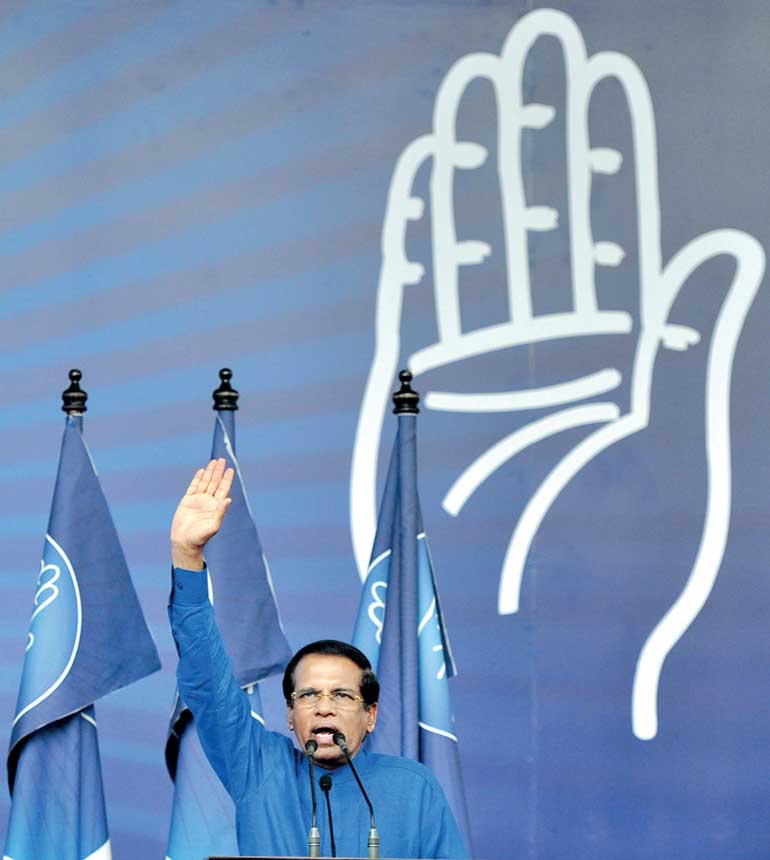Thursday Feb 19, 2026
Thursday Feb 19, 2026
Monday, 4 September 2017 00:58 - - {{hitsCtrl.values.hits}}
By Uditha Jayasinghe
As Sri Lanka prepares for higher debt repayments over the next few years, President Maithripala Sirisena yesterday said meeting loan obligations would be the second phase of the tasks the Coalition Government has set for itself.

President Maithripala Sirisena gestures during his address at the 66th anniversary celebrations of the SLFP
– Pic by Ruwan Walpola
The first phase of the cooperation between the Consensual Government composed of the Sri Lanka Freedom Party (SLFP) and the United National Party (UNP) was to face the international community’s pressure on reconciliation. Addressing thousands of supporters at the 66th anniversary celebrations of the SLFP, which were held on the President’s birthday, Sirisena recalled the immense scrutiny Sri Lanka faced after failing to promote ethnic harmony after the war ended in 2009.
“Whatever certain parties say it was the Consensual Government built by the SLFP and the UNP that gave me the authority and confidence to go before the world and say that we deserve a chance to strengthen democracy, we need more time to build reconciliation,” he told a cheering crowd.
The President recalled that by 2014 Sri Lanka had already lost GSP+ and was struggling with a fisheries ban, both imposed by the European Union. He said more sanctions would likely have been slapped on Sri Lanka if the Unity Government had not worked extensively to engage the international community and the United Nations Human Rights Council (UNHRC) to remove itself from investigations into alleged war crimes during the last phase of the conflict. Despite forging stronger international relations, Sirisena was adamant he would protect all members of Sri Lanka’s security forces as well as the country’s sovereignty against any external pressure.
“All party members were invited for these anniversary celebrations but some have not attended. They say they will not participate until we end the agreement with the UNP. History has shown us that during times of danger political parties have put aside their differences and worked together. This happened during World War I and World War II. This happened in Japan, Vietnam and South Korea. Even during the war the SLFP and UNP presented different versions to the world. For the first time we are presenting a unified stance to the world and that has brought prestige to Sri Lanka,” he said.
Having restored Sri Lanka’s international standing, the next challenge will be to tackle debt, the President insisted, adding that the same dedication and inclusiveness will continue to be practiced. However, even though the SLFP and UNP will govern together they will contest elections separately, the President stated, calling on his supporters to prepare for elections.
International rating agencies have already warned Sri Lanka’s debt dynamics are such that the domestic debt repayments will reach a peak next year, following which there is a bunching up of external debt repayments from 2019 onwards, every year for three years.
These debt repayments put enormous pressure on both the Government and market liquidity with knock-on effects on interest rates, inflation and the exchange rate. They could also erase the country’s foreign reserves, worsening an already volatile external front.
The data shows that as much as $ 5 billion worth of sovereign bond maturities are due from 2019-2022. Moody’s in a statement released on 1 August estimated external debt maturities in 2019-22 to total a staggering $ 13.8 billion.
The President in his speech also recalled his predecessor’s decision to call for early presidential elections stressing that he had disagreed with the move and advised for reforms but was ignored by former President Mahinda Rajapaksa.
“As General Secretary I presented a six-point letter that highlighted the political, social and economic reforms that needed to be completed before calling for another election. This was because I knew that the public was dissatisfied with the anti-democratic steps taken by the former Chairman of this party. SLFP seniors received copies of this letter. But in the end it was all overlooked,” he said.
Sirisena contended that Rajapaksa had called for early elections because he was “wary of the high levels of debt and international pressure over reconciliation.” He also touched upon the “infamous hopper story”, pointing out that it was a meeting to discuss possible elections with party leaders of the United People’s Freedom Alliance (UPFA) but at it no leader was willing to commit to the pending polls.
Politicians should focus on people, not power, advocated the President, mentioning several instances when leaders blinded by their own popularity were unprepared for the swift change of voters’ minds. As a party that had promoted good governance, clean politics and equitable development, Sirisena urged his supporters and fellow politicians to come forward to end corrupt politics. This was also the key message of the party anniversary where different segments of the party put forward different proposals for development that were accepted. One of the key suggestions was forging public-private partnerships (PPPs) to reform loss-making state-owned enterprises (SOEs) which was presented by the SLFP Youth Wing.